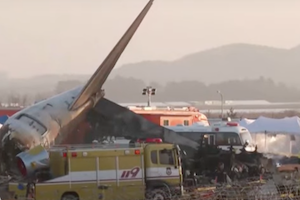Jeju Air Crash Triggers Ticket Refund Surge, Damaging Low-Cost Carrier Image

A Boeing 737-800 aircraft operated by South Korea's Jeju Air crashed on December 29, resulting in 179 fatalities, making it the deadliest aviation accident in South Korea's history. In the aftermath, Jeju Air faced a massive wave of ticket cancellations, with travel agencies also experiencing a large number of order cancellations. Additionally, Boeing's stock price dropped nearly 5% during early trading on December 30.
Experts have pointed out that the crash has severely damaged the image of low-cost carriers, and there are growing concerns in the industry about a potential decline in future demand for air travel. Industry insiders reported that their companies held urgent meetings on the day of the crash to discuss its impact and formulate response strategies. One insider remarked, “This incident is likely to have an unavoidable impact on operations.”
What is particularly worrying is that the involved Boeing 737-800 is the main aircraft type used by South Korean low-cost carriers. Jeju Air currently operates 39 of these aircraft, while T'way Air, Jin Air, and EasyJet Korea have 27, 19, and 10 of these planes, respectively.
Jeju Air revealed that by 1 p.m. on December 31, it had received around 68,000 ticket refund requests, including approximately 33,000 for domestic flights and 34,000 for international flights. Despite the increase in refund requests, the airline emphasized that the number of new bookings remained stable. A Jeju Air official stated at a press conference, "Although the refund rate is higher than usual, new bookings have not changed."
Travel agencies have also been affected. One large travel agency disclosed, “In the first hour of business after the crash, over 400 orders were canceled.” Many customers also inquired about whether their flights were operated by a Boeing 737-800, and if so, they requested to cancel their trips.
Following the crash, Jeju Air's flight schedule also faced scrutiny. According to data from Flightradar24, the involved aircraft had completed 38 flights in the past week, including 6 routes the day before the accident, with almost no rest periods in between. Experts believe that the densely packed flight schedule may have compromised maintenance and inspection processes, thereby posing a threat to flight safety.
Boeing has also suffered from the fallout of the crash, with its stock price dropping 4.9% during early trading on December 30. Meanwhile, South Korea's Ministry of Land, Infrastructure, and Transport announced that it would conduct special inspections on the 101 Boeing 737-800 aircraft operating domestically to identify potential safety issues.
This crash serves as a wake-up call for the low-cost aviation industry and highlights the need for airlines to strike a balance between safety and operational efficiency. Industry experts noted that the incident is not only a tragedy but also an opportunity for the aviation industry to strengthen safety measures and improve operational practices.
- 158 reads
Human Rights
Fostering a More Humane World: The 28th Eurasian Economic Summi

Conscience, Hope, and Action: Keys to Global Peace and Sustainability

Ringing FOWPAL’s Peace Bell for the World:Nobel Peace Prize Laureates’ Visions and Actions

Protecting the World’s Cultural Diversity for a Sustainable Future

Puppet Show I International Friendship Day 2020

